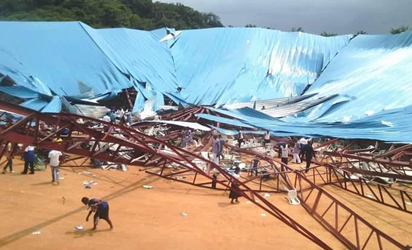
The gloom and mourning pervading the streets of Uyo, the capital of Akwa Ibom State, may take a while to recede following the death of about 29 people and the injury of about 168 persons in a collapsed church building in the state capital. Reigners Bible Church, Uyo, founded by one Pastor Akaninyene Urua, was the death trap where the state’s Chief Executive, Mr Udom Emmanuel, reportedly escaped death by the whiskers. But some of his aides and many other worshipers were not that lucky. Pastor Akaninyene, apparently a very influential clergyman in the state, had invited the governor and many other dignitaries to witness his consecration as a bishop in an uncompleted church auditorium which was allegedly hurriedly ‘finished’ to meet up with the event. Tragedy reportedly struck shortly after the governor and his entourage arrived and literally settled in: the pillars of the building started to collapse and, ultimately, the roof caved in on the people, killing some and injuring many. In the ensuing stampede, many of the victims were reportedly trampled on as everyone who was still conscious made frantic efforts to escape from the ill-fated auditorium.
The state governor who had come to grace the occasion became the arrow-head of the rescue operation and evacuation of the dead and the injured in a disaster which should not have happened in the first place. It is really grieving that the incident resulted in the loss of many lives and injuries to a lot of people. Thank God that Governor Udom Emmanuel escaped unhurt, a development that afforded him the opportunity to take immediate post-tragedy decisions that have helped to stabilize the polity and calm frayed nerves. However, it is hoped that he will go the whole hog to address the critical, underlying issues. The unceremonious exit of the face, soul and symbol of a sub-national government within the Federation in a collapsed building would have worsened the damage the Uyo disaster has done to the security and safety ratings of the country.
It is most unfortunate that building collapse has now assumed a dangerous dimension and an intolerable frequency across major cities in Nigeria. Perhaps it should be mentioned that similar incidents had happened elsewhere in the country; in Lagos, Abuja, Port Harcourt and many other towns and cities. Many incidents that happen in small towns and villages even go unreported. It is a sad story of a country where many citizens have an uncanny and unenviable penchant for cutting corners. It is therefore unsettling but not really surprising that these tragic incidents have nothing to do with natural disasters but were usually human-made and patently self-inflicted.
The usual cause has always been the use of fake building materials or the employment of quacks in place of professionals to handle building projects, or both. And since there seems to be a sense of impunity by the owners of failed buildings, the artisans or professionals who put up unsafe buildings, the relevant professional and the regulatory bodies , it has been difficult to rein in the avoidable tragedies. What gets measured gets done. But in a clime where after the initial cacophony and outrage that attend a tragic incident, such incident virtually ceases to engage public discourse until another one happens, a vicious cycle is inevitable.
It is satisfying to note that a panel has been set up by the Akwa Ibom State government to launch an enquiry into the remote and immediate causes of the Reigners Church building collapse. That unfortunate incident by reason of the circumstances of its occurrence is a crime against the state, not withstanding whether or not there was an element of premeditation. It is, therefore, urged that the panel be empowered and accorded the liberty to do an independent and thorough investigation. The objective of this inquiry should not only be to punish those who might be one way or the other responsible for the tragic incident; it should include the design of a robust and stringent policy and regulatory environment that will ensure that all buildings in the state are safe.
The panel should not go the way of earlier ones in other parts of the country whose outcomes have yet to reduce cases of building failure in Nigeria. We commiserate with the government and people of Akwa Ibom State and in particular the families of the deceased and the injured over the shocking and tragic incident. One of the best ways to ensure that the victims did not die in vain is to ensure that useful lessons have been learnt to put paid to this terrible scenario. There should be minimal standards that public buildings should meet to hold public events in Nigeria and such standards must be enforced in all situations and at all times.
END

Be the first to comment